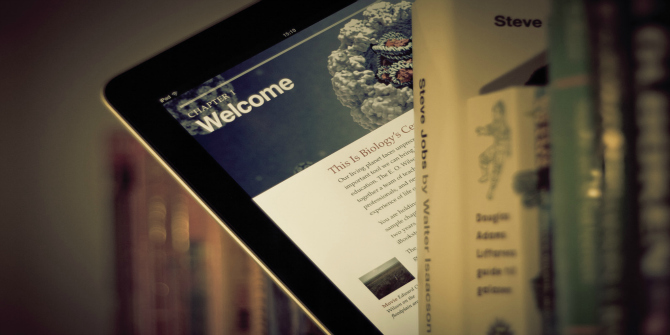 It’s a common view amongst academics that publicly funded research has to be made publicly available. It isn’t necessary to condemn publishers but it is necessary to get them out of the way. The oddities of the market that allowed barrier-based publishers to cruise into this century are breaking down, writes Mike Taylor.
It’s a common view amongst academics that publicly funded research has to be made publicly available. It isn’t necessary to condemn publishers but it is necessary to get them out of the way. The oddities of the market that allowed barrier-based publishers to cruise into this century are breaking down, writes Mike Taylor.
“No man can serve two masters: for either he will hate the one, and love the other; or else he will hold to the one, and despise the other.” – Matthew 6:24.
It’s a truism among academics that until your work is published, it “doesn’t count”. The academic publishing system has been with us for hundreds of years, and changed very little throughout the 20th Century. It didn’t need to, because authors of research papers were so dependent on the publishers. On the whole, relations between authors and publishers were cordial and even warm.
But that’s changing fast. The Internet has thrown the stable relationship into disarray as authors realise how little they now need most of the services that publishers provide. And because the traditional publishing model requires authors to hand all rights over to publishers without recompense, that realisation has been accompanied by a burgeoning sense of outrage, seen most obviously in a growing boycott of Elsevier (the largest commercial publisher) that has accumulated 8600 signatures in less than eight weeks. We have a network that can send infinite perfect copies all over the world instantaneously. For authors, it’s not just crazy when access is deliberately limited by paywalls – it’s immoral.
Publishers’ reactions to the boycott have been varied: bafflement, sadness, defensiveness, condescension. “Within my company I see individuals who are genuinely committed to serving the scientific community”, protested Elsevier VP Liz Smith, somewhat plaintively, “Stop wasting time complaining about how evil we are.” Without question there are many fine people working with the best intentions for the big commercial publishers. It must be truly disheartening to have gone into publishing with a desire to help researchers only to find yourself the target of their fury.
But the situation is beset by a fundamental paradox. “One of Elsevier’s primary missions is to work towards providing universal access”, proclaims a recent position statement. But you will find no mention whatsoever of access in the 900 words of the Chairman’s statement in the annual report, nor in the 1600 words of the Chief Executive Officer’s report. Both are entirely to do with financial performance.
And that’s not surprising – or even, really, wrong. Because the simple fact of the matter is that Elsevier, like Springer, Wiley and the rest, is a for-profit corporation. And that means that their primary responsibility is to their shareholders. Directors are legally required to act in the interests of the corporation rather than those of customers or the broader academic world.
This of course is true of all for-profit corporations. But it’s not usually a problem in most businesses because the interests of customers are aligned with, or at least not incompatible with, those of the company. When customers are served well, the corporation does well. Unfortunately, this isn’t the case with academic publishing. Customers fall into two categories: the authors who write papers and the people who read them. The interests of these two groups are aligned: authors want their work to be distributed freely, to be as widely read as possible, because in academia visibility is currency. So authors and readers both want open access. But traditional publishers are habituated to a revenue stream based on charging for access. It is a model based on scarcity. Scarcity was a very real problem twenty years ago, when each copy cost money to make and more to ship. The value of publishers was the help they offered in overcoming these problems. But now that the Internet has annihilated the problems of duplication and transmission, all that is left for subscription-based publishers is to create scarcity so that they can charge for resolving the problem that they cause. The business model now is to erect paywalls, then charge to lower them: a flagrant waste of time and resources in which effort is squandered on building clever ways to make the world worse.
So however much these publishers talk about universal access or about serving customers, the truth is that they are serving themselves. And authors, readers and society are paying for it.
And let’s say it once more: for-profit publishers can’t exactly be blamed for this. It’s the nature of the beast. Remember, directors are required to act in the financial interests of the corporation. It has narrow, focussed concerns. I am reminded of Captain Quint’s description of a shark in Jaws: “what we are dealing with here is a perfect engine… All this machine does is swim and eat and make little sharks.” It does what it does; and it does it with perfect single-mindedness.
And that is why talk of such publishers being “evil” is really misplaced. They do what they do. It would be more accurate to call them “blind” or “unthinking”. When they fight tooth and nail to prevent open access, they are no more being evil than a shark is when it attacks its prey; no more evil than a brick wall across a motorway.
But here’s the thing. If a shark threatens people, then it has to be destroyed. A wall across a motorway has to be demolished. And publicly funded research has to be made publicly available. It isn’t necessary that we morally condemn a publisher that gets in the way of that self-evidently just goal. But it is necessary to get it out of the way. To demolish it, if it won’t move.
And that is exactly what’s happening now. The oddities of the market that allowed the barrier-based publishers to cruise into the new century are breaking down. The monopoly effects of the top journals are less important than previously and becoming progressively less so. The rise of prestigious open-access journals is offering authors more choices. The 8600 researchers who have signed the boycott, together with an unknown number of others who have made the same decision without proclaiming it, are taking the motorway wall apart, brick by brick.
Note: This article gives the views of the author(s), and not the position of the Impact of Social Sciences blog, nor of the London School of Economics








Visibility is not currency in academia. Visibility *to the right people* is currency in academia.
jb-w, your statement is correct but I don’t understand what you mean by it. Do you feel that my oversimplification undercuts the argument?
Mike, as this is the Impact of the Social Sciences blog, it would be interesting to hear you say a little about these debates specifically as they affect social scientists. The publishers taking the heat so far have been the STM giants, and the mobilised academics primarily scientists. That is not to say that social scientists wouldn’t also benefit from OA, or that technology isn’t a universal. But there are different contexts and challenges to the STM market – journal pricing, funding models, immediacy of content, and so on. PLoS-level author charges in the social sciences would be deemed far too high. It feels as though much more earth needs to be shifted in order to get to OA in the HSS disciplines, and also that the level of anger or demand is not yet at STM levels (although the RWA debate and pieces like this one have raised awareness considerably). Your thoughts on the social sciences would be appreciated, so we can move this conversation from the general /polemical to the specific/calm (what does OA in the social sciences really look like, and how do we get there in a relatively pain-free way for social science academics, learned societies so depedent on journal income, and librarians? Is the total destruction – rather than transformation – of social science publishers what these groups actually want or need?).
David Q. says: “as this is the Impact of the Social Sciences blog, it would be interesting to hear you say a little about these debates specifically as they affect social scientists.”
That is a legitimate request, but I’m afraid not one that I can satisfy. I’m a scientist myself (a palaeobiologist) but was asked to contribute to this blog because the issues of for-profit barrier-based publishers are obviously of relevance in all fields of research.
“There are different contexts and challenges to the STM market – journal pricing, funding models, immediacy of content, and so on.”
I’m not sure how true this is, though. Of course not all fields are the same — for that matter, the publishing issues in one science are very different in detail from those in another — but the fundamentals are the same across all of academia. The issue comes down to: who controls knowledge? The obvious reasonable answers would be either the researchers who create it or the public that funds it, and we could have a discussion about which claim is the stronger. (My vote goes to the public.) Instead, in the hard sciences, social sciences and indeed humanities and arts, we have an absurd situation where control rests on a third party who neither funds nor executes the work. After that observation, and without wanting to trivialise real differences, I think that everything else is implementation detail.
“PLoS-level author charges in the social sciences would be deemed far too high. It feels as though much more earth needs to be shifted in order to get to OA in the HSS disciplines.”
There are plenty of alternatives to a PLoS-like approach. One of the most successful (and this makes us biologists very jealous of mathematicians and physicists) is arXiv, a massive preprint server where scientists in relevant fields routinely reposit their papers before sending them to journals. arXiv is free to both authors and readers — it’s grant-funded at a level that works out to $7 per paper. I am sure something similar could work in HSS, maybe with an author-pays $10-50 fee or similar. (For that you don’t get editorial services or peer-review of course, but journals can still provide that in exchange for control of the nicely formatted final version.)
[BTW., don’t forget that PLoS offers fee waivers. In the sciences, they get taken by IIRC about 15% of papers. In HSS the percentage might be so much higher that they couldn’t afford to do this. So the might not be a transferrable model.]
“… and also that the level of anger or demand is not yet at STM levels (although the RWA debate and pieces like this one have raised awareness considerably).”
I really hope so! Please, if you do nothing else, spread the world. It’s extraordinary to me that we academics have allowed ourselves and the public to be exploited for so long. Anger is the correct response to this, and a prerequisite of breaking out.
Great points, Mike. No need to call paywalling publishers evil at all – if they want to act like brick walls, let’s just jump over or walk around them http://thecostofknowledge.com/
How much does arranging for and organizing peer-review really cost? Because copy editing is nice, but hardly worth what journals are charging. So peer review and reputation are really the remaining value-added by commercial publishers since distribution is trivial in the digital age. As imperfect a process as it is, peer review is still critical. Without it, we would be drowned in a sea of “free energy” “Time-cube” and other nonsense. While PLoS is a major initiative, I suspect that the average university could host a scientific journal in the same way that they often host a “Law Review” journal.